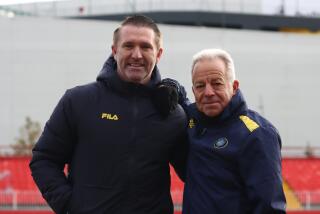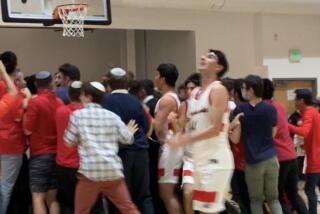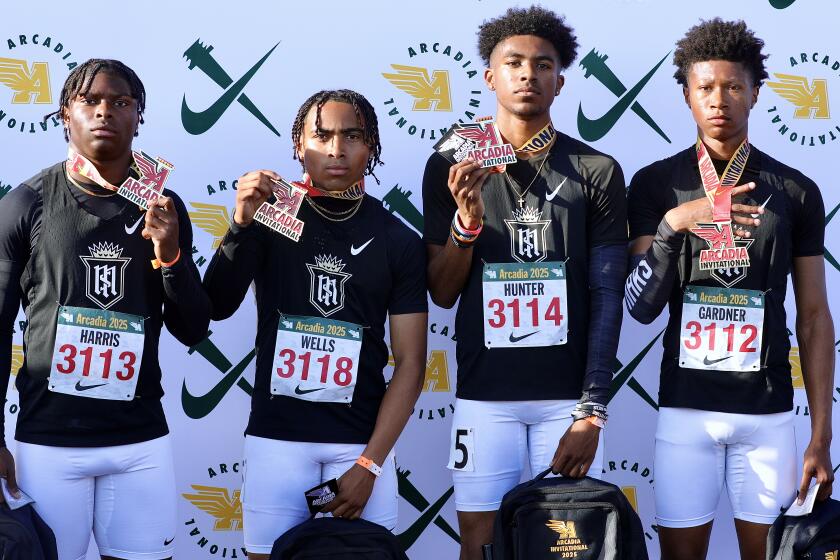Now, They Have a Reason to Shout at Connecticut : College basketball: Coach Jim Calhoun still likes to scream at his players. But now, he has a freshman from Israel who is giving him something good to shout about.
- Share via
STORRS, Conn. — Connecticut basketball coach Jim Calhoun can get ugly. He’ll slap a player upside the psyche, stomp around on his ego, get in his face and under his skin. During a game, when his demeanor rivals Cujo’s, Calhoun is a raging stream of consciousness.
“Bad life style,” he screams in response to a Murray Williams mistake.
“Weight training,” he spits disgustedly at strength coach Jay Hoffman.
“You couldn’t guard a couch,” he informs Tate George, who during his career has been blamed for everything from mental lapses to the decline of the dollar on world currency markets.
The Wrath of Khan is nothing compared to the Wrath of Calhoun. And even though the players have learned to dismiss the bleep-bleep delivery in favor of the message, no one wants to be on the receiving end of a Calhoun tirade.
Except for Nadav Henefeld.
When Calhoun finally got uptight and personal with the freshman forward from Israel during the Connecticut Mutual Classic in December, Henefeld wasn’t chagrined. He was delighted.
“It was one of his greatest moments when Coach finally cursed him out,” says Hoffman, one of Henefeld’s closest friends. “He was so happy. He thought he was being pampered a little and he didn’t like it. He didn’t want his teammates to think he was special. It was, and is, very important to him to fit in.”
The 6-foot-7, 226-pound Henefeld is one of the keys to the No. 8 Huskies’ surprising success. He is averaging 10.7 points, 6.2 rebounds and 28.1 minutes per game. He already holds the school record for steals in a season (95) and is second nationally in that category. So adept is the former Israeli soldier at commandeering the ball that one New York City tabloid has tagged him “The Gaza Stripper.”
Before Connecticut’s game with St. John’s Jan. 27, Henefeld was presented with a plaque naming him Big East player of the week. He earned the honor for his play against Syracuse and Georgetown two weeks ago, and he is the first freshman to win the award. He has also been Big East rookie of the week twice.
Henefeld, who will be 22 in June, grew up in Ramat-Hasharon, Israel, which is located about 15 minutes from Tel Aviv. His mother died when he was 6, and he was raised by his father, Zeev, and his sister, Anat, who is four years older and a student studying language and literature at Tel Aviv University.
“Yes, it was a sad time,” Henefeld says, “I remember my mother, but I was very young when she died.”
Although Henefeld is reserved and shows little outward emotion on and off the court, when he talks about his father, and when he talks about his country, the affection and pride he feels for each is apparent.
“My father worked so hard and he also raised two kids,” he says. “I think my father is just great.”
Zeev Henefeld, who is an engineer and runs a small metal factory, is 6-foot-3, and according to Nadav played a little basketball in his youth. He has yet to see his son play in America.
“He’s working, but I really hope he can come over and see me play here,” Nadav says. “It’s getting near the end of the season. We talk about him coming all the time. I really want him to come.”
Nadav began playing basketball at age 9. He was taller than most of his friends and picked up the game quickly. There was no rusting hoop in the Henefeld driveway. Instead, he honed his skills at the local athletic club. The organized games at the club, as opposed to playground ball, helped mold the sound fundamental style that is evident in his play today.
After graduating from high school, Henefeld was inducted into the army to begin serving his mandatory three years of active duty. Everyone in Israel, men and women, must serve in the military and then remain on reserve status until age 55.
Although much has been made of Henefeld’s military experience, some portraying him as the second coming of Moshe Dayan, in truth, Henefeld patrolled a desk. Probably the closest thing he had to a rank was small forward.
“I went through basic training, but my job in the army was not that of a regular soldier,” Henefeld says. “I was allowed to play basketball, go to practice every day, travel abroad with the national team. There is more than one way to represent Israel. The government and the army understand this, and a certain number of athletes are allowed to play.”
While in the military, Henefeld wrote letters and sent his statistics to 20 colleges in the United States, but he attracted no interest. Finally, St. John’s invited him for a visit, as did Connecticut. Calhoun first heard about Henefeld from Marv Kessler, a former Adelphi coach who also coached in Israel.
Henefeld visited St. John’s last April for two days and then came to Storrs, where he spent about five hours. It was long enough. He fell in love with the campus, rural atmosphere, and New England, which he calls “a unique, very beautiful place.”
Henefeld also liked Calhoun and the Connecticut coaching staff, but Calhoun wasn’t about to offer him a scholarship without having seen him play. In July, Calhoun flew to Israel for the Maccabiah Games.
As is the case with many visitors to Israel, Calhoun was apprehensive. Two days before he left, 14 people were killed by a terrorist bomb on a bus. “There was a little bit of anxiety,” Calhoun says, “but when you get there you find it’s very westernized and Tel Aviv is a cosmopolitan city.
“Nadav laughs when people talk about Israel as being dangerous. ‘How can you think it’s dangerous in Israel,’ he’ll say, ‘when you think about New York City.’ And he’s right. At 3 a.m. you can walk down the streets of Tel Aviv and feel completely safe.”
After watching Henefeld play several times during his five-day visit, and be named MVP of the Games, Calhoun offered a scholarship. But there were still obstacles to overcome: as in Proposition 48 and the requisite SAT scores.
Henefeld, who had a high academic average in high school, had taken the SATs during his April visit but fell about 40 points short of the required 700 to meet NCAA eligibility standards. In September, he was allowed by the NCAA to take the test again. This time he scored over 800.
“I can’t say the language was a problem,” Henefeld says, “even though there were words on that test that I have never read and will never read again. I just didn’t understand what I had to do. When it was explained to me exactly what the test was, I didn’t have any problem.”
One final hurdle Henefeld had to clear concerning eligibility cropped up when someone sent the NCAA a letter, in Hebrew, claiming Henefeld had been paid for playing some games in Israel. After university and NCAA investigations, the allegations were determined to be untrue.
Last semester, Henefeld took and passed such courses as chemistry, geology, English and Hebrew. Not your usual freshman basketball player’s curriculum.
Calhoun admits he treated Henefeld differently from other players at first. “When he came here, he did so based on his personal relationship with me. I had to handle him differently because he’s a unique kid. The more comfortable I felt he was here, the more I felt he could be treated like any other player. I’ve come to understand he just wants to be treated like a basketball player.”
“If I do something wrong now he (Calhoun) shouts at me,” Henefeld says, “but he shouts at everybody. You have to take what he really means, and not take it personally.”
Calhoun also brought Henefeld along slowly on the court, bringing him off the bench for the first 10 games. As Henefeld adjusted to the American college game, it became apparent he was a special talent.
“He’s not one of the great runners and jumpers in the league, one of the oohs-and-ahhs guys,” Calhoun says. “His game is unspectacular, but he does things that other people don’t do. Rebounding, he’s a clinic, and he uses angles very well. If he gets beside you with the ball, you’re beat.”
Just because Henefeld doesn’t exhibit even a dash of flash is not to conclude he isn’t a gifted athlete. Besides being very strong from the hips down, where it is most important for a basketball player, he is also sneaky fast. In a 30-yard sprint, Henefeld is third fastest on the team, leaving such players as John Gwynn, Scott Burrell and Chris Smith in his wake.
But Henefeld’s greatest attribute as a player may be mental. He has the gift of knowing where everyone is on the court at all times and to be a step ahead of the action. “His understanding of the game is intuitive,” Calhoun says.
Where Henefeld’s gift of anticipation has been most evident is on defense. He broke Bobby Dulin’s school record for steals in a season (83) in 19 games, and he is averaging 4.3 per game.
What should be frightening to the opposition is that Henefeld is still inputting data. To watch him on the court is to come away with a sense that when he begins printing out what he has assimilated, his level of play is going to be elevated.
One of the adjustments Henefeld has enjoyed making is to the crowds. “The crowds here are great,” he says, “they make you want to play harder. We appreciate the fans, we like it very much.”
“He’s been sending a lot of clips and tapes back home,” Calhoun says, “but he told me, ‘They’ll see me play, but they’ll never see the excitement.’ ”
Interestingly, Henefeld appears to be almost unaware of the crowd when he plays. “In a game you won’t see much expression on my face,” he says, “but I see, hear and feel everything. I am a calm person on the basketball court, but I am calm in life, also.”
Henefeld’s cool was never more apparent than in the Huskies’ 70-65 victory over Georgetown when motor-mouthed Alonzo Mourning began yapping. “I just ignored him,” Henefeld says. “We played hard against Georgetown and maybe they didn’t like it so much.”
Henefeld also says the basketball fans here are more sophisticated than in Europe. “I’ve had people come up to me and say that was a really nice play when you picked that guy on the weak side. It’s great to get feedback from people who really appreciate what you’re doing out on the court.”
That’s a change from last season when ESPN’s Bill Raftery had commented on the docile nature of the fans at the Civic Center.
“One of the reasons the Connecticut crowds are really getting into the games may be Henefeld,” Raftery said. “If you like basketball, this kid Henefeld is going to turn you on.”
While Henefeld has improved each game in his maiden voyage around the Big East, Calhoun believes he will be further challenged when he sees teams for the second time.
“He reminds me of the young phenom that comes up every spring and hits a lot of home runs,” Calhoun says. “By the second time around the league they figure out how to pitch to him. I have great respect for our league. I’ve seen guys do all right the first time but by the next time people have seen a lot of videotape. If he has a weakness, they’ll find it. He’ll get a lot more attention the second time around. He may not have the same people playing him. Nadav, the team, is going to have to adjust. But he’s gone from being this foreign guy to a feature guy, to the first freshman in history to be the Big East player of the week. . . . Now the challenge continues.”
And should The Dav falter, well, Calhoun won’t hesitate offer some bleep-bleep words of coaching encouragement at full volume. Nadav Henefeld is just one of the guys now.
He has earned the abuse.
More to Read
Go beyond the scoreboard
Get the latest on L.A.'s teams in the daily Sports Report newsletter.
You may occasionally receive promotional content from the Los Angeles Times.










